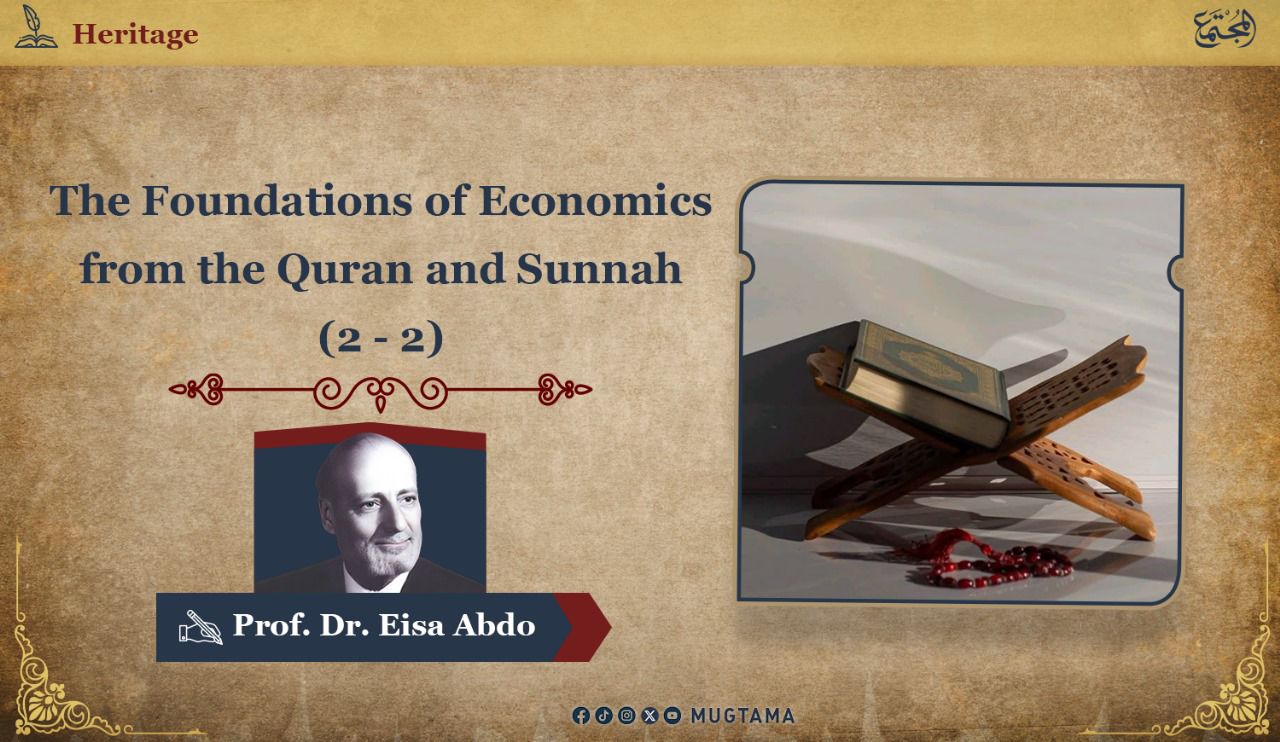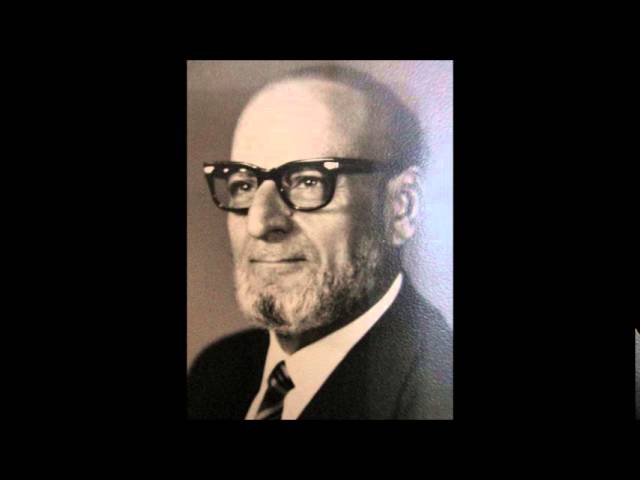Islamic Economy
The Foundations of Economics from the Quran and Sunnah ( 2-2)

A Recent History
In the course of the past two hundred years, an immeasurable
library has accumulated for economic studies, and intellectual schools,
scientific methodologies, and vigilant organizations have emerged over this
matter, which is summarized in two words: "Wealth and Service." These
two are the poles of a single axis. Efforts revolve around them, and hopes are
attached to them—the hopes of individuals and groups, from the small circle of
people to the tribes, nations, and peoples: to the blocs that are sometimes
colored by a visible desire to seek a livelihood, such as our saying "Common
Market," and other times colored by global military and diplomatic
affairs, such as our saying "Alliances, Organizations, and Bodies."
Across all these levels, the issue is one: wealth and service, or if you wish, well-being
(welfare). This is because the well-being of the individual and his surrounding
family, and the well-being of the people, from its ruler to the last of its
subjects, depends on the share of every individual in the immediate enjoyment
and in security, and these two are elements that fall within the concept of
well-being. The economic studies are therefore closely connected to the daily
life of all people in every age and land. So, why, then, is there an insistence
by trusted authorities on mentioning two hundred years ago from this day of
ours as the temporal container for what is known in our time as Political
Economy?
They said that the French
Revolution coincided with the beginning of the Industrial
Revolution, and these two together gave rise to many social, political,
and economic revolutions. Change encompassed both thought and events. Some, "including
Charles Rist," tried to establish the correct sequence for both thought
and events—which is the origin and which is the dependent factor!!
After an enlightened analysis, he abandoned the attempt and
concluded that they are two phenomena on a revolving orbit. This does not
negate, naturally, that a team of left-wing
writers says that events are the origin and that material change is
what leads to everything else, with comprehensive detail in socialist thought.
However, we mention here a writer who attempted to establish a neutral opinion,
and by him, we mean the French scholar we mentioned earlier, "Charles
Rist," and historical events in all fields—not just economics alone—have
demonstrated that the attempt to separate facts from the development of
opinions is a wasted effort.
The Prey of
Underdevelopment
They also said that within the framework of this time
period, from the French Revolution until now, lies the nineteenth century
"which has passed" and the twentieth century which has crossed the
spring of its age (its early years). Regarding the nineteenth century in
particular, there are details of utmost importance for everyone involved in
economics, both theoretically and practically. As for us, the Arabs, these
details are vital, because the nineteenth century is what witnessed the final
chapters of the story of the Ottoman State, just as it witnessed the groundwork
for the dismemberment of its land after the Great War. And when
the Caliphate
was abolished in 1924, the land, resources, and interests of the Arabs
became prey to every greedy person. With the resources leaving the hands of
their owners, the ability to join the march of technological progress weakened.
From here arose a great fallacy called "Underdevelopment"
(takhalluf), and this fallacy still clings to us; we repeat it and endorse it.
This means that the nineteenth century, then, is the most important segment of
the last two hundred years. So, when did it begin, and when did it end?
The Entry of Workers into Parliament
The consensus is that the nineteenth century began in July
of the year 1789 A.D. with the fall of the Bastille...
And with the fall of other strongholds behind which certain
conditions of wealth distribution and the hardships of earning a livelihood had
existed, just as systems that elevated and lowered (people) based on race,
affection (love), and class disparity had existed. With the subsequent collapse
of the strongholds, one after the other, after the Bastille, events unfolded
over dozens of subsequent years and remained so until the masses that marched
upon the structures of oppression in 1789 A.D. reached the end of the journey.
So, when was that?
And is it inevitable that the tumultuous masses in the
French capital reach the end of the journey in the lifetime of the generation
that began the march, or do they spend their lives on the road, handing over
the leadership to the children and after them to the grandchildren, until the
goal of the first march is achieved, even if it is after two generations??
A statement that does not lack logic resolved the connection
of the nineteenth century, with its events and ideas, to a clear end in the last
year of 1905, because in the month of the following year, "1906," the
first contingent of Workers' representatives reached the British House of
Commons, in a country that is rightly considered one of the consultative
countries of the West. This was out of a concern for the right of the owner of
wealth "or the taxpayer, as they say" to supervise and hold the state
accountable in every matter, especially wealth and service—how much of them
remains for the individual and his family, and how much the public authorities
undertake to collect and distribute, and what are the features of justice in
the distribution of benefits and sacrifices??
The English people were one of the oldest peoples of the
West in this matter, having preceded the French Revolution by two full
centuries, and they were extremely attached to the old ways. Therefore, when
the worker "who at that time did not pay taxes, but rather received
services" reached the House of Commons, this historical fact alone was a major
signpost on the road. It guides researchers in the totality of human affairs to
the fact that the march that began in the streets of Paris in 1789 continued to
move forward until the vanguards reached the House of Commons in London in
1906. At that point, the events of the nineteenth century would have been integrated
into the twentieth century!!
A statement that does not lack logic, affirmed by historians
of economic thought and the political maturity that molded the European peoples
in modern history. Yet, a group of writers insists on saying that the march was
still at the final stage, if we consider all individuals, peoples, and
governments. The events of the nineteenth century were approaching their climax
when the workers reached Parliament, this is true, but the integrated structure
of the events of this period was still coherent and rushing in the orbit of
time until the Great
War broke out in 1914. At that point, the nineteenth century reached
the peak of aggregation and accumulation for both events and social changes
among individuals and states at all levels. With the launch of the war demon at
that time, time folded a full register and opened another one. Its first pages
were the container for the first bloody conflict on a global scale, combining comprehensiveness
with the extension of battles across various fronts for five years. At that
point, the twentieth century began!!
The Failure
of Contemporary Economics
We say that this, too, is a logic worthy of consideration.
Between these two opinions, this time period stands with its dimensions and its
horrors in our history as Arabs, to show us the origins of the tragedy we live
today.
The most dangerous aspect of the nineteenth century is its economic
events and its economic ideas too... All of this preceding statement is a
matter of agreement. An extremely important question is built upon this, which
we raise before these articles. So we say: Is this the time to research the
foundations of economics from the Quran and the Sunnah, when we know that the
sources of the discourse then take us back fourteen full centuries!! And how do
we reconcile believing in the unique status of the events of the nineteenth
century with preoccupying ourselves with talking about the seventh century
A.D.?
This is a question that circulates in academic circles and
in graduate studies in particular. Then, the overwhelming majority of the
nation receives it with eagerness and fervor. To answer it, books have been
published and voices have been raised, and we are still at the beginning of the
road. Therefore, we hasten to say that there is no academic luxury in this
matter, nor is it a preoccupation with the glorious past, distracting from the
bitter present. We say that this matter, which seemed decades ago like a daydream
or wishes woven from imagination, has captured the paths of thought for some
researchers. Some of them believe in it, and others were driven to it by the failure
of economics—all of Western and Eastern economics—to achieve its great goals.
Therefore, (the researcher) returned to search in what was before the
nineteenth century and before the Renaissance era, which came from the old
Middle Ages. Then, he stopped at the era of the Prophet and retraced his steps
with the progress of time anew, but in the procession of the light of the
Islamic heritage. And behold, this heritage is still fresh (authentic/new)—if
it spoke, it spoke.
A great demand is what we aim for, and it requires, before
it, an appraisal and evaluation of what is known as conventional economics and why
the efforts of its supporters and opponents have gone with the wind.
And this is the subject of consideration in the following
article, God willing, Lord of the Worlds.











